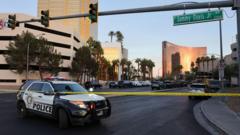The Las Vegas explosion of a Tesla Cybertruck outside the Trump International Hotel has become a focal point for investigators seeking to understand the motives behind the incident that resulted in minor injuries to seven people. The car’s driver, 37-year-old Matthew Alan Livelsberger, identified as a special forces soldier, was found dead inside the vehicle with a self-inflicted gunshot wound, sparking a series of inquiries into the events that transpired leading up to the explosion.
One significant question that has emerged is why Livelsberger chose to rent the Cybertruck in Colorado and drive over 800 miles to Las Vegas, arriving just hours before the explosion. Las Vegas police tracked his movements through photographs and Tesla’s charging technology, confirming he had operated the vehicle alone. Investigators confirm that although Livelsberger was killed in the incident, they have yet to uncover any motivations for his travels or ultimate act.
Another angle of inquiry revolves around whether the explosion was intended as a political statement. Given the explosion's location outside Trump’s hotel and the vehicle’s maker, investigations are underway to determine if the act may have any political underpinnings. So far, authorities have not found concrete evidence linking Livelsberger to any specific ideological stance or group, despite FBI acknowledgment that the incident's context is noteworthy.
Furthermore, questions have surfaced regarding potential links to a deadly vehicular attack in New Orleans the same day, which left several dead and many more injured. Both Livelsberger and the New Orleans attacker, Shamsud-Din Jabbar, served in the U.S. armed forces and used rental services for their vehicles. However, police have indicated the absence of evidence suggesting a connection or coordination between the two men’s actions. Jabbar’s attack was motivated by affiliations with extremist groups, a stark contrast to Livelsberger's situation where no such motivation has been established.
Livelsberger’s background may shed further light on his state of mind prior to the explosion. A decorated soldier, he was reportedly on leave from his station in Germany and had recently visited family in Colorado. His father described their last conversation as normal, with no red flags indicating turmoil. News reports highlighting Livelsberger's support for Trump and patriotism add layers of complexity to his profile, leading to speculation regarding his mental state leading up to the tragic explosion.
As investigations continue, the lack of clarity surrounding Livelsberger’s motives, possible connections to political events, parallels to the New Orleans attack, and his military background are central to understanding the implications of this unsettling event. Law enforcement has emphasized that while investigations remain active, no definitive conclusions have been drawn regarding the motivations or affiliations involved in this incident.






















